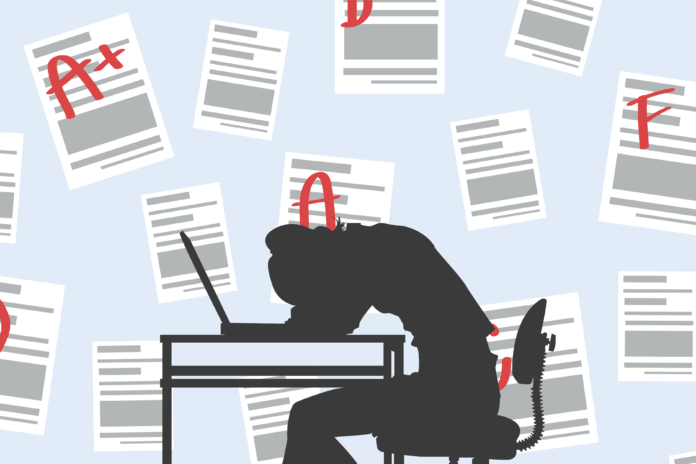The union is demanding compensation for what they view as additional labor required of lecturers due to fall UAW strike
By Lev Farris Goldenberg — campus@theaggie.org
The UC-AFT lecturer’s union filed an Unfair Labor Practice (ULP) charge against UC Davis on Dec. 30 in response to the university’s extension of fall quarter’s grade submission deadline.
“UC-AFT supported our UAW siblings in their strike and we are holding the UC accountable for any ramifications their inability to negotiate a fair contract with UAW had on our members,” Katie Arosteguy, communications coordinator for the Davis chapter of UC-AFT and a lecturer in the UWP department, said.
The ULP charge alleges that the UC violated the Higher Education Employee Relations Act (HEERA) when they extended the grading periods at multiple campuses, an action that the union says “required lecturers to work through their scheduled holidays.”
With academic workers on strike for higher wages and better labor practices during fall quarter finals, a backlog of ungraded student work built up. As a result, the university initially pushed the grade deadline to Dec. 28 before later extending the date to Feb. 13, according to an email to UC Davis staff and faculty sent by Provost and Executive Vice Chancellor Mary Croughan.
According to Croughan’s email, a majority of instructors of record were able to submit grades by the initial deadline of Dec. 28. However, not all lecturers were able to submit grades, and instead submitted a ‘No Grade’ (NG) for their students.
Courtney Caviness, a professor in the Sociology department, told students in an email that she would likely be unable to submit fall quarter grades by the Feb. 13 date.
“I have 250 students across two classes, and it would be impossible […] for me to grade the backlog for both my courses while also fulfilling my teaching contract for Winter quarter,” Caviness wrote in the email.
The lecturer union’s charge also alleges that lecturers were coerced into doing “struck work,” which, according to Arosteguy, lecturers have a right under HEERA to refuse.
Struck work is “a product which is produced by an employer during the period of a labor dispute with his employees,” according to the International Brotherhood of Teamsters.
In response, UC-AFT filed a Demand to Bargain and is currently engaged in effects bargaining with the university.
Arosteguy, who has been a lecturer at UC Davis for 13 years, is part of the team of UC-AFT bargainers. According to Arosteguy, the team is asking for two things: that the UC give lecturers the ability to remove fall 2022 student evaluations from their review files, and compensation for what they view as additional labor due to the strike.
According to UC-AFT, “the disruptions caused by the strike caused some undergrads to evaluate lecturers more harshly than they would have under ordinary circumstances.”
The second demand is in response to a survey conducted by UC-AFT of 260 members, in which 66% responded that they felt compelled to perform additional labor due to the strike, as the work normally done by TAs or graduate students became their responsibility.
“We are asking for fair compensation for this extra work,” Arosteguy said. “We have passed a proposal to the university and are awaiting their response.”
He went on to say that their next step is working towards the California Public Employment Relations Board (PERB) — which administers and enforces HEERA — issuing a complaint in this case.
“Once we receive the complaint, the normal process is to enter into settlement conferences with the university where we can come to a fair agreement over the outstanding issues,” Arosteguy said.
As part of the grade deadline extension, Croughan’s office offered funding for lecturers who need support to complete grading.
“I am extending my offer to provide funding for hiring extra grading help to assist instructors of record impacted by the labor stoppage,” Croughan said in her email. “Instructors of record who would like to request support should contact their department chair or supervisor to coordinate with their dean’s office immediately.”
“It is unclear whether there are enough of these readers to cover all of the remaining work, which is another reason we are asking for fair compensation for any lecturer who ends up doing this extra work,” Arosteguy said.
Meanwhile, many students still have not received their grades.
Ashton Yeremian, a third-year sociology major, has one NG outstanding from fall quarter in his political sociology class. Due to this, he did not meet the unit requirement for the quarter.
“Most people in the class were supportive of the strike,” Yeremian said. “Because many of us are going to be grad students, we understood that sometimes people have to suffer some inconveniences in order to get proper living conditions.”
Once the strike started, Yeremian said that his professor started holding classes on the picket line.
“For me, I’m not very affected by [the late grades], so it’s easy for me to say that,” Yeremian said. “I can be understanding that the grades are taking a while, but I can see how if you’re already on academic probation and there are no grades coming up, that would be pretty scary for a lot of people.”
Written by: Lev Farris Goldberg — campus@theaggie.org




